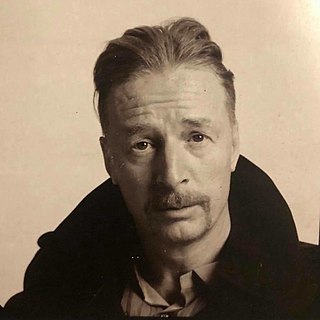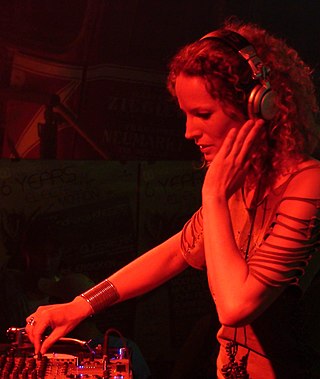Breakbeat hardcore is a music genre that spawned from the UK rave scene during the early 1990s. It combines four-on-the-floor rhythms with breakbeats usually sampled from hip hop. In addition to the inclusion of breakbeats, the genre also features shuffled drum machine patterns, hoover, and other noises originating from new beat and Belgian techno, sounds from acid house and bleep techno, and often upbeat house piano riffs and vocals.

A rave is a dance party at a warehouse, club, or other public or private venue, typically featuring performances by DJs playing electronic dance music. The style is most associated with the early 1990s dance music scene when DJs played at illegal events in musical styles dominated by electronic dance music from a wide range of sub-genres, including drum and bass, dubstep, trap, break, happy hardcore, trance, techno, hardcore, house, and alternative dance. Occasionally live musicians have been known to perform at raves, in addition to other types of performance artists such as go-go dancers and fire dancers. The music is amplified with a large, powerful sound reinforcement system, typically with large subwoofers to produce a deep bass sound. The music is often accompanied by laser light shows, projected coloured images, visual effects and fog machines.

Freetekno is a cultural movement that is present in Europe, Australia and North America. Freetekno sound systems or tribes form in loose collectives, frequently with anarchist philosophies. These sound systems join to hold parties wherever a viable space can be found – typical locations include warehouses, fields, abandoned buildings or forests. Because freetekno parties are usually held illegally this sometimes leads to clashes with the police, as was the case at both the 2004 and 2005 Czechtek festivals and many other, smaller parties around the world at different times.
Hardcore is a genre of electronic dance music that originated in the Netherlands, Belgium, and Germany in the early 1990s. It is distinguished by faster tempos and a distorted sawtooth kick, the intensity of the kicks and the synthesized bass, the rhythm and the atmosphere of the themes, the usage of saturation and experimentation close to that of industrial dance music. It would spawn subgenres such as gabber.

Helmut Josef Geier, known professionally as DJ Hell, is a German DJ.
Bouncy techno is a hardcore dance music rave style that developed in the early 1990s from Scotland and Northern England. Described as an accessible gabber-like form, it was popularised by Scottish DJ and music producer Scott Brown under numerous aliases.

Maximilian Lenz, known by his stage name WestBam, is a German DJ and musician. He is the co-founder of the record label Low Spirit.

Ellen Fraatz, known professionally as Ellen Allien, is a German electronic musician, music producer, and the founder of BPitch Control music label. Her album Stadtkind was dedicated to the city of Berlin, and she cites the culture of reunified Berlin as one of the main inspirations for her music. She sings in both German and English. Her music is best described as a blend of IDM and techno music, which is dance-floor oriented and has noticeable experimental elements. She lives in Berlin and calls it the "best city in the world."

Thomas Brückner, known by his stage name Tomcraft, was a German DJ and producer. He specialized in progressive house and progressive trance music and is better known for having created the tracks "Loneliness", "Prosac", "The Circle", "The Mission", "25:17" "Silence" and "Overdose" working alongside Eniac.
German electronic music is a broad musical genre encompassing specific styles such as Electroclash, trance, krautrock and schranz. It is widely considered to have emerged in the late 1960s and early 1970s, becoming increasingly popular in subsequent decades. Originally minimalistic style of electronic music developed into psychedelic and prog rock aspects, techno and electronic dance music. Notable artists include Kraftwerk, Can, Tangerine Dream and Deutsch Amerikanische Freundschaft. German electronic music contributed to a global transition of electronic music from underground art to an international phenomenon, with festivals such as Love Parade, Winterworld and MayDay gaining prominence alongside raves and clubs.

Monika Kruse is a German techno DJ/producer and record label owner, with a career in electronic music spanning more than 25 years. She played an influential role in the early Munich rave scene during the early 1990s and was among the first wave of German techno artists to tour internationally, before moving to Berlin at the end of the decade where she founded her Terminal M record label.
Low Spirit Recordings was a German techno record label.
Techno is a genre of electronic dance music which is generally produced for use in a continuous DJ set, with tempos being in the range from 120 to 150 beats per minute (BPM). The central rhythm is typically in common time (4/4) and often characterized by a repetitive four on the floor beat. Artists may use electronic instruments such as drum machines, sequencers, and synthesizers, as well as digital audio workstations. Drum machines from the 1980s such as Roland's TR-808 and TR-909 are highly prized, and software emulations of such retro instruments are popular.
The Ufo was the first acid house club in Berlin. It is considered a pioneering place for the techno scene during the reunification. Residents and guest DJs at the club included, among others, Tanith, Jonzon, Rok, Dr. Motte, Mike van Dijk and the then 13-year-old Kid Paul.

Fabian Lenz is a German DJ, Techno musician and events producer, who was also known before under the moniker DJ Dick.

Frankie ‘Bones’ Mitchell is a prominent figure in the development of dance music within the United States. Widely regarded as the "Godfather of American Rave Culture". Throughout the 80s & 90, Frankie played a major role in developing NYC's underground party scene. Bones began his career in the early 1980s, spinning at clubs and parties throughout New York & New Jersey. Bones gained widespread global recognition after organizing the first outdoor dance music party in the US. Storm Rave took place in Williamsburg, Coney Island, & Plumb Beach. Throughout his career, Frankie has produced, remixed, and officially released countless tracks, albums, EP's, and mixtapes. He has also performed at many large scale music festivals around the world such as Love Parade and Insomniac's Electric Daisy Carnival (EDC).Frankie continues to be an influential figure in the community and remains active as a performer, producer, and author represented globally by Southfirst (S1).
Abel Polo, known by his stage name Abel el'toro, is a DJ, producer and promoter from Sydney, Australia.
Wilhelm Christian "William" Röttger was a German label owner, music manager and gallery owner. Röttger co-founded the influential German techno label Low Spirit and managed the music festival Mayday.

Ultraschall was a nightclub in Munich, Germany from 1994 to 2003. The techno club belonged, besides the Tresor and E-Werk in Berlin, the Dorian Gray and Omen in Frankfurt, and the Munich-based clubs KW – Das Heizkraftwerk, Natraj Temple and Millennium, to the most renowned clubs of Germany's 1990s techno culture. According to FazeMag, Ultraschall was "for many techno fans the most authentic techno club alongside the Tresor".
Belgian hardcore techno is an early style of hardcore techno that emerged from new beat as EBM and techno influences became more prevalent in this genre. This particular style has been described as an "apocalyptic, almost Wagnerian, bombastic techno", due to its use of dramatic orchestral stabs and menacing synth tones that set it apart from earlier forms of electronic dance music. It flourished in Belgium and influenced the sound of early hardcore from Netherlands, Germany, Italy, UK and North America during the early-1990s, as a part of the rave movement during that period.











